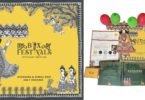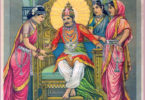Five year old Atharv was on cloud nine. His maternal grandmother (Naani) was visiting them. Naani too was very happy because earlier, meeting Atharv was limited to a fortnight only. Atharv’s parents’ annual leave constricted this meeting. This time it was Naani who had made the trip.
Naani was trying to give him a dose of Indian culture. Atharv had confided in her solemnly, ‘I like Halloween not Diwali. Halloween is fun.’ Naani decided that they would try to make Diwali this year ‘fun’, though fire crackers, the biggest attraction, obviously could not be included. She declared that everybody would wear Indian dresses and Atharv raised much hue and cry. ‘No dhoti, it slips. I want my jeans.’ It took a huge amount of coaxing and cajoling to dress him up in an Indian festive attire.
Naani wore a Kanjeevaram silk sari. Atharv came and stood observing her from the doorway of the room. ‘Naani where are your legs?’ he asked in a voice full of wonder.
She laughed and said, ‘Come here.’ He came and stood near her. She hugged him while standing.
‘Oh, they are inside,’ he sounded relieved.
He did enjoy the Pooja and sweets but they couldn’t beat the trick-or-treat of Halloween.
Now on Naani’s agenda were all the stories of parees and rakshasaas from mythology. Atharv eagerly looked forward to what he termed ‘Once-upon-a-time’ time. That stories can be told verbally was a novelty for Atharv. He was used to his parents reading to him from the book. He wanted to hear stories of Mighty Machines, fire trucks, Chuggingtons, planes and space – the familiar figures from his story books and TV comics. Naani wanted to wean him away from these to tell him stories from Panchtantra, of young Ganesha – the elephant God, Lord Krishna and Lord Ram. Atharv was good at bargaining. They formed a pact – one story of Atharv’s familiar characters and one of Naani’s choice.
Snow White’s story fascinated him. The seven dwarfs caught his imagination. One night, ten minutes after the story was over, he asked in a sleepy voice, ‘Naani, what is the meaning of ‘die’?’ Naani hesitated. Death is an inescapable fact of life. She found herself at a loss, so she took refuge in religion. ‘When people die they go to God. Actually God calls them.’ He fell asleep and Naani heaved a sigh of relief. But she knew that little Atharv’s tenacity would make him pursue the topic, and sure enough the question popped up again while she was helping him bathe next day. ‘Naani, God won’t decide to come and get me, will he?’
‘No, dear.’
‘Snow White’s mother died, Naani. Can my mother die?’
‘Oh, no. That was a story. People, old people die. When people become very old then they die.’
That day also like all other days, Atharv’s mother, before going to work, cautioned him, ‘No funny business! Don’t pester my mother. Don’t ask her to carry you on her back. No more ‘attaa ki bori’ games. Naani is old, she gets tired.’ He liked to be carried on Naani’s back pretending to be a bag of flour ready to be sold. He waved his mother good bye but he looked concerned, ‘Naani, will you die? You are old.’
‘Yes, I’m old but not ill. When people fall ill they die.’
When Atharv came back from school, he looked quite thoughtful. While talking about his day at school he blurted, ‘Naani, I told Tobey that old people die, but he said his mother had told him that everyone dies. Will I die?’ He seemed frightened.
Naani tried to distract him but the needle of his record was stuck in one groove. This time Naani sought refuge in illness. ‘Didn’t I tell you – when people become critically ill they die. Healthy people don’t die.’ This reassured him.
With winter approaching, colds, coughs and viral fever were making their presence felt. Ironically, two days later there was a phone call that Atharv should be collected from the school because he had shot up a fever. He was brought home. He had a headache and nausea. He was given some analgesic and felt slightly better. The persistent questioner in him asked, ‘Am I critically ill? Am I going to die?’
‘No. See, your fever is gone. Your fever was seasonal. You know the seasons, don’t you? The Fall has gone, winter has come – you must have taken off your sweater in the playground and caught cold.’
By now the adults in the family realized that they could not soft-pedal the truth anymore. Talking about death to a child is challenging. His misconceptions, fears, worries had to be dealt with. Atharv’s father had been expecting this question for a long time because on seeing dead animals in one documentary on Discovery Channel, he had asked him, ‘Papa, what is rotting? How do bodies rot?’
Next day Mummy and Papa and Atharv had a serious talk. No long lecture or complicated replies to his questions were given. Mummy said, ‘When people die they do not breathe, eat, talk anymore.’ It was explained to him that everybody dies eventually, but most people live for a long time and they are sure he would too. ‘We all would do everything in our power to keep you healthy and safe.’ He should not worry about them. His Papa joked with him, ‘I plan to live a very long time and you know your Mummy always says that I’m a good planner. We plan to live till you are grown-up with kids of your own.’ Thus the nebulous idea that death was to be expected sometime in future, was incubated.
Next day Naani, to underline the idea that she was old but healthy, carried Atharv on her back and they tried to sell the attaa ki bori. Papa bought it for seven dollars, Naanu bought it for eight dollars and Mummy for five – Atharv had to answer every time, ‘How many dollars do we have now?’ He realized that she was trying to teach him additions orally. They took a break. His fertile brain came up with a brilliant idea and he smiled. ‘What are you thinking? Are you having a funny thought?’ asked Naani, intrigued.
‘Why? Can you see a cloud over my head?’
Naani was confused. Then it dawned on her that in his comic books, thoughts of characters were written in bubbles drawn over their heads. Amused by the mental agility of the young, she said, ‘No, I cannot read your thoughts. Let’s play.’
This time when they went to his Papa to make the sale, the atta ki bori negotiated and declared he wanted to be sold for zero dollars. The same thing happened in negotiations with Naanu and Mummy, ‘Zero dollar, zero dollar.’ And Atharv beamed with happiness because he had outwitted Naani – no more counting! Zero plus zero is zero.
Naani mused that someday in future an adult Atharv would realize what a deep philosophical truth of human existence, eternity and infinity he had arrived at in those two days.





Nice.
Thanks, Joysree.
Such a emotional and well written story. The innocence in children is priceless !
Yes, isn’t it? I am glad you enjoyed the story. Thanks for the encouraging words!